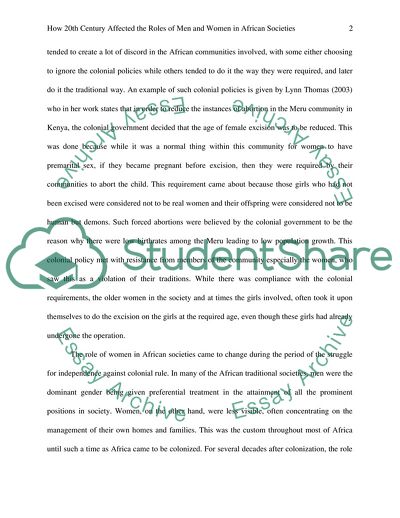Cite this document
(The Influence of the Twentieth Century on the Roles of Men and Women in African Societies Essay Example | Topics and Well Written Essays - 2000 words, n.d.)
The Influence of the Twentieth Century on the Roles of Men and Women in African Societies Essay Example | Topics and Well Written Essays - 2000 words. https://studentshare.org/history/1794334-is-gender-chaos-an-accurate-reflection-of-how-the-twentieth-century-affected-the-roles-of-men-and-women-in-african-societies
The Influence of the Twentieth Century on the Roles of Men and Women in African Societies Essay Example | Topics and Well Written Essays - 2000 words. https://studentshare.org/history/1794334-is-gender-chaos-an-accurate-reflection-of-how-the-twentieth-century-affected-the-roles-of-men-and-women-in-african-societies
(The Influence of the Twentieth Century on the Roles of Men and Women in African Societies Essay Example | Topics and Well Written Essays - 2000 Words)
The Influence of the Twentieth Century on the Roles of Men and Women in African Societies Essay Example | Topics and Well Written Essays - 2000 Words. https://studentshare.org/history/1794334-is-gender-chaos-an-accurate-reflection-of-how-the-twentieth-century-affected-the-roles-of-men-and-women-in-african-societies.
The Influence of the Twentieth Century on the Roles of Men and Women in African Societies Essay Example | Topics and Well Written Essays - 2000 Words. https://studentshare.org/history/1794334-is-gender-chaos-an-accurate-reflection-of-how-the-twentieth-century-affected-the-roles-of-men-and-women-in-african-societies.
“The Influence of the Twentieth Century on the Roles of Men and Women in African Societies Essay Example | Topics and Well Written Essays - 2000 Words”. https://studentshare.org/history/1794334-is-gender-chaos-an-accurate-reflection-of-how-the-twentieth-century-affected-the-roles-of-men-and-women-in-african-societies.


